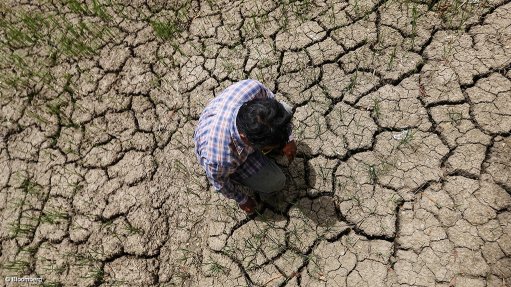
Despite the significant increase in rainfall across South Africa in recent weeks, the country is still experiencing a severe drought, noted Council for Scientific and Industrial Research (CSIR) climate modelling chief researcher Professor Francois Engelbrecht on Wednesday.
Speaking at a CSIR briefing in Pretoria, he noted that South Africa had recently moved into the next big heatwave of the summer season.
Engelbrecht added that at the beginning of the traditional summer rainy season, South Africa was still experiencing severe drought in areas including the eastern Free State, most of Mpumalanga, the Kruger National Park, Limpopo and the North West province.
He also pointed out that the entire interior was experiencing mild to moderate drought as the country moved into the current summer season, and that there was no guarantee what would happen next regarding the climate.
“We have had three summer seasons in a row with below-normal rainfall, culminating in El Niño - a complex weather pattern resulting from variations in ocean temperatures in the Equatorial Pacific. We hope we will get good rains this current season,” said Engelbrecht.
He further noted that another reason for the severe drought was the extremely high temperatures experienced, especially between October and December 2015, which were exceptionally dry months.
According to Engelbrecht, temperature records were broken between December 2015 and February 2016.
“Across the entire Southern African region, we experienced the warmest summer in recorded history with a high frequency of heatwave events.”
He added that the heatwaves had a direct impact on the agriculture sector, especially in the presence of low rainfall.
According to Engelbrecht, it also indirectly impacts on South Africa’s water security as leads to more evaporation from dams.
“Last summer was an exceptional season because it was associated with the largest El Niño event ever recorded.”
He added that 2015 was the warmest year recorded since 1850, attributed to El Niño and systematic global warming, which was a result of the greenhouse gas (GHG) effect.
“In climate change science, when we refer to mitigation, it’s about how we can limit the emission of these greenhouse gases into the atmosphere,” he said.
Engelbrecht pointed out that mitigating emissions was a global effort in moving away from fossil fuels to renewable forms of energy, or nuclear energy, as a source of energy for the planet.
He further noted that the Paris Agreement, an agreement within the United Nations Framework Convention on Climate Change dealing with GHG emissions mitigation, adaptation and finance starting in the year 2020, has been signed by almost 200 countries.
“South Africa has an ambitious plan in reducing its own emissions from our coal plants. Its intending to do its fair share in terms of climate change mitigation,” he said.